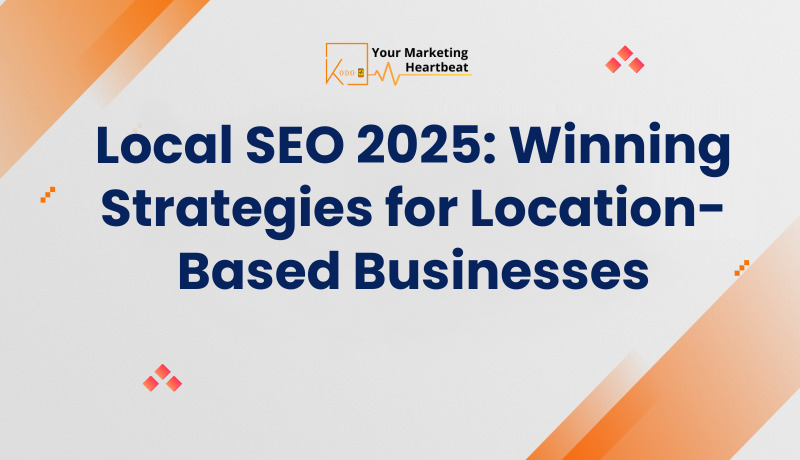
Local SEO 2025: Winning Strategies for Location-Based Businesses
In the ever-evolving landscape of digital marketing, local SEO has emerged as a vital component for businesses aiming to connect with their communities. As we look ahead to 2025, understanding and implementing effective local SEO strategies will be crucial for businesses that rely on foot traffic and local clientele. This article will explore the essential tactics for optimizing your online presence, enhancing your Google Business Profile, and leveraging local search trends to attract more customers.

Understanding Local SEO
Local SEO is the practice of optimizing your online presence to attract more business from relevant local searches. This involves ensuring that your business appears in local search results when potential customers are looking for services or products in your area. Unlike traditional SEO, which targets a broader audience, local SEO focuses on a specific geographic area, making it essential for brick-and-mortar businesses.
The Importance of Local SEO
With a significant percentage of consumers using search engines to find local businesses, neglecting local SEO can lead to missed opportunities. For instance, studies show that a large portion of users who conduct local searches visit a business within a day. This highlights the urgency and intent behind local searches, making it imperative for businesses to optimize their online presence effectively.
Key Components of Local SEO
To succeed in local SEO, businesses must focus on several key components:
- Google Business Profile Optimization: This is the cornerstone of local SEO. A well-optimized profile can significantly enhance visibility in local search results.
- NAP Consistency: Ensuring that your Name, Address, and Phone number are consistent across all platforms is crucial for building trust with search engines and customers alike.
- Localized Content Creation: Crafting content that resonates with your local audience can help establish authority and improve engagement.
- Online Reviews: Positive reviews not only build trust but also influence local search rankings.
Google Business Profile Optimization
Your Google Business Profile (GBP) is your digital storefront. It’s the first impression potential customers will have of your business when they search online. Therefore, optimizing your GBP is essential for local SEO success.
Steps to Optimize Your Google Business Profile
- Claim and Verify Your Profile: Ensure that you have claimed your GBP and completed the verification process. This step is crucial for appearing in local search results.
- Complete All Information: Fill out every section of your profile, including business hours, categories, and a detailed description. Use relevant keywords naturally within your description to improve search visibility.
- Add High-Quality Images: Visual content can significantly enhance engagement. Upload high-quality images of your products, services, and team to create a more inviting profile.
- Encourage Customer Reviews: Actively solicit reviews from satisfied customers. Responding to reviews, both positive and negative, shows that you value customer feedback and are engaged with your audience.
The Impact of Google Business Profile on Local SEO
A well-optimized GBP can lead to higher visibility in the local pack, which is the section of Google search results that displays local businesses relevant to the search query. This visibility can drive more traffic to your website and increase foot traffic to your physical location.
Local Search Ranking Tips
To improve your local search rankings, consider implementing the following strategies:

1. Ensure NAP Consistency
Your business’s Name, Address, and Phone number should be consistent across all online platforms, including your website, social media, and local directories. Inconsistencies can confuse search engines and potential customers, negatively impacting your rankings.
2. Create Location-Specific Landing Pages
If your business operates in multiple locations, consider creating dedicated landing pages for each area. Each page should include localized keywords, unique content, and relevant information about the services offered in that specific location.
3. Leverage Local Backlinks
Building backlinks from local websites can enhance your authority and improve your search rankings. Engage with local organizations, sponsor community events, or collaborate with local influencers to earn valuable backlinks.
4. Optimize for Mobile
With a growing number of consumers using mobile devices for local searches, ensuring that your website is mobile-friendly is crucial. A responsive design, fast loading times, and easy navigation can significantly enhance user experience and improve your search rankings.
Hyperlocal Marketing Trends
As competition intensifies, businesses are increasingly focusing on hyperlocal marketing strategies. This approach targets specific neighborhoods or communities, allowing businesses to connect with local customers more effectively.
Strategies for Hyperlocal Marketing
- Utilize Local Keywords: Incorporate hyperlocal keywords into your content, such as neighborhood names or local landmarks, to attract nearby customers.
- Engage with the Community: Participate in local events, sponsor community initiatives, or collaborate with other local businesses to strengthen your presence in the area.
- Create Community-Focused Content: Develop content that highlights local events, news, or resources. This not only positions your business as a community leader but also improves your local SEO.
The Role of Online Reviews
Online reviews play a significant role in local SEO. They not only influence potential customers’ decisions but also impact your search rankings.
Best Practices for Managing Online Reviews
- Encourage Reviews: Make it easy for customers to leave reviews by providing links or QR codes that direct them to your review platforms.
- Respond to Reviews: Engage with customers by responding to their reviews. Thank them for positive feedback and address any concerns raised in negative reviews.
- Monitor Your Reputation: Use tools to track your online reputation and review performance. This will help you identify trends and areas for improvement.
Local Content Creation
Creating localized content is essential for establishing authority and engaging with your audience. This content should resonate with your local community and address their specific needs.
Types of Local Content to Consider
- Blog Posts: Write about local events, news, or topics relevant to your industry. This can help attract local traffic and improve your search rankings.
- Guides and Resources: Create comprehensive guides that provide valuable information to your local audience, such as “The Best Places to Eat in [Your City].”
- Customer Stories: Share testimonials or case studies from local customers to build trust and credibility within your community.
Technical SEO for Local Businesses
While on-page optimization is crucial, technical SEO also plays a significant role in local search rankings. Ensuring that your website is technically sound can improve user experience and search engine visibility.
Key Technical SEO Considerations
- Schema Markup: Implement structured data markup to help search engines understand your business information better. This can enhance your visibility in search results.
- Site Speed: Optimize your website’s loading speed to improve user experience and reduce bounce rates. Tools like Google PageSpeed Insights can help identify areas for improvement.
- Mobile Optimization: Ensure that your website is fully responsive and provides a seamless experience across all devices.
Measuring Local SEO Success
To determine the effectiveness of your local SEO strategies, it’s essential to track key performance indicators (KPIs).
Important Metrics to Monitor
- Local Search Rankings: Use tools to track your rankings for local keywords and monitor changes over time.
- Website Traffic: Analyze organic traffic to your website, focusing on visitors from local searches.
- Conversion Rates: Measure the effectiveness of your calls to action, such as appointment bookings or contact form submissions.
Conclusion
As we move into 2025, local SEO will continue to evolve, and businesses must adapt to stay competitive. By focusing on Google Business Profile optimization, leveraging local backlinks, and creating engaging content, you can enhance your online presence and attract more local customers. Remember, the key to success lies in understanding your audience and delivering value that resonates with them. Embrace these strategies, and watch your business thrive in the local market.

